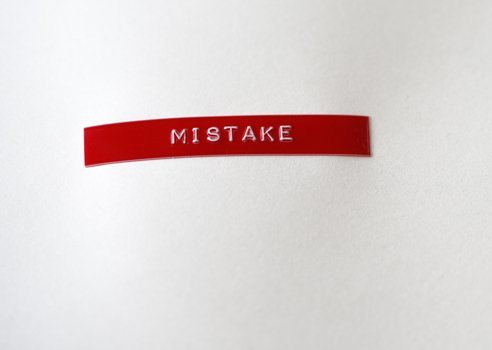Reading time: About 3 minutes
Today’s column looks at the important topic of preventing mistakes — and dealing with the ones you haven’t been able to avoid making.
I live in a glass house. No, I’m not talking about my own home, which we’re currently renovating. (Project to be finished Feb. 24! I’ll write about that soon.) I’m talking about this column. People generally like my work, but when I make a mistake, well, watch out! Those rocks come flying through my walls.
Not that I’m complaining. I’m just pointing out why I have a special expertise for writing today.
Last week’s column, I’m embarrassed to admit, claimed three errors. The first was about the date of the book Seabiscuit. It was published in 2001, not 2007 as I wrongly stated. (Thanks, James!)
The sentence about the jockey: “We’re appalled by the serious injuries Red Pollard endures, as he’s thrown from horses and captivated by his remarkable recoveries,” has a misplaced clause. No, as subscriber Jean points out, I did not mean that Red Pollard was captivated by his own remarkable recoveries — I meant that we readers were. I could have fixed it all with a semi-colon. “We’re appalled by the serious injuries Red Pollard endures as he’s thrown from horses; at the same time, we’re captivated by his remarkable recoveries.”
Readers Beryl and Joanna asked about my section that said, “I loved the book. And so did my husband — who is just as disinterested in horses as I.” What I should have written is, “He is as little interested in horses as I.” The word disinterested is the opposite of interested only when the latter implies an expectation of personal gain. As Beryl concluded, this suggests that neither of us bets on the horses. (Although that’s 100% accurate, I confess I didn’t know the true definition of disinterested.)
Now that you understand my great expertise with mistakes, let me give you a five-point strategy for dealing with them and maybe even preventing them.
1) Be aware of the mistakes you make typically and have a plan in place for capturing them. I’m most embarrassed by my error over the publication date. That’s exactly the kind of mistake my fragile mind is most likely to make and I should have known to double check.
2) Consider how important accuracy is for your particular job. Writing isn’t brain surgery, and readers generally won’t die if you make a mistake, but some works are more important than others. For example, when I finished my book, 8½ steps to writing faster, better, I had a dozen educated, opinionated friends read it first (they caught lots of mistakes) and then paid a professional proofreader (she caught even more!) The column you read here, however, is free. This means I don’t have the budget for professional proofreading. And that leads me to my next point.
3) Be sure to have a good self-proofreading practice. It’s hard to catch the typos we all make because our brains already know what we want to say and we tend to self-correct, unconsciously. As a result, I proofread this column at least four times. And two of those times involve printouts (the eye catches more on a printed page than on a screen.) And, to my family’s despair, one of those times involves reading this column out loud. Despite this, a few mistakes still slip by. Thus,
4) . . . be gracious when people point out your errors. When readers email me with corrections, I always write back (if you emailed me and didn’t receive a reply it means I didn’t receive your email) and I’m polite and appreciative, even when, very rarely, the correspondent is rude. Humble pie doesn’t taste as bad as you might think.
5) Try harder to do better. I once followed a blogger who persisted in using the phrase “land on your franny.” (I don’t know who poor Franny was, but she must get awfully tired of people falling on top of her!) The correct phrase, of course, is “land on your fanny.” I guess the blogger must have received lots of complaints about this because she subsequently posted a rather angry screed about complainers who were perfectionists and thus would never live fulfilled lives. Wrong approach!
We should learn from every mistake and try hard never to make it again.


